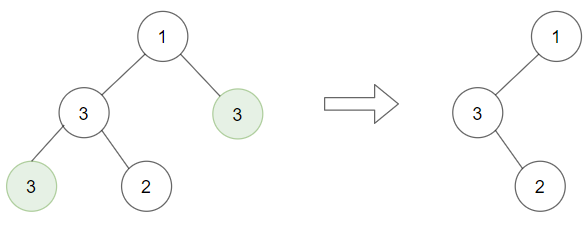Welcome to Subscribe On Youtube
1325. Delete Leaves With a Given Value
Description
Given a binary tree root and an integer target, delete all the leaf nodes with value target.
Note that once you delete a leaf node with value target, if its parent node becomes a leaf node and has the value target, it should also be deleted (you need to continue doing that until you cannot).
Example 1:

Input: root = [1,2,3,2,null,2,4], target = 2 Output: [1,null,3,null,4] Explanation: Leaf nodes in green with value (target = 2) are removed (Picture in left). After removing, new nodes become leaf nodes with value (target = 2) (Picture in center).
Example 2:

Input: root = [1,3,3,3,2], target = 3 Output: [1,3,null,null,2]
Example 3:

Input: root = [1,2,null,2,null,2], target = 2 Output: [1] Explanation: Leaf nodes in green with value (target = 2) are removed at each step.
Constraints:
- The number of nodes in the tree is in the range
[1, 3000]. 1 <= Node.val, target <= 1000
Solutions
-
/** * Definition for a binary tree node. * public class TreeNode { * int val; * TreeNode left; * TreeNode right; * TreeNode() {} * TreeNode(int val) { this.val = val; } * TreeNode(int val, TreeNode left, TreeNode right) { * this.val = val; * this.left = left; * this.right = right; * } * } */ class Solution { public TreeNode removeLeafNodes(TreeNode root, int target) { if (root == null) { return null; } root.left = removeLeafNodes(root.left, target); root.right = removeLeafNodes(root.right, target); if (root.left == null && root.right == null && root.val == target) { return null; } return root; } } -
/** * Definition for a binary tree node. * struct TreeNode { * int val; * TreeNode *left; * TreeNode *right; * TreeNode() : val(0), left(nullptr), right(nullptr) {} * TreeNode(int x) : val(x), left(nullptr), right(nullptr) {} * TreeNode(int x, TreeNode *left, TreeNode *right) : val(x), left(left), right(right) {} * }; */ class Solution { public: TreeNode* removeLeafNodes(TreeNode* root, int target) { if (!root) { return nullptr; } root->left = removeLeafNodes(root->left, target); root->right = removeLeafNodes(root->right, target); if (!root->left && !root->right && root->val == target) { return nullptr; } return root; } }; -
# Definition for a binary tree node. # class TreeNode: # def __init__(self, val=0, left=None, right=None): # self.val = val # self.left = left # self.right = right class Solution: def removeLeafNodes( self, root: Optional[TreeNode], target: int ) -> Optional[TreeNode]: if root is None: return None root.left = self.removeLeafNodes(root.left, target) root.right = self.removeLeafNodes(root.right, target) if root.left is None and root.right is None and root.val == target: return None return root -
/** * Definition for a binary tree node. * type TreeNode struct { * Val int * Left *TreeNode * Right *TreeNode * } */ func removeLeafNodes(root *TreeNode, target int) *TreeNode { if root == nil { return nil } root.Left = removeLeafNodes(root.Left, target) root.Right = removeLeafNodes(root.Right, target) if root.Left == nil && root.Right == nil && root.Val == target { return nil } return root } -
/** * Definition for a binary tree node. * class TreeNode { * val: number * left: TreeNode | null * right: TreeNode | null * constructor(val?: number, left?: TreeNode | null, right?: TreeNode | null) { * this.val = (val===undefined ? 0 : val) * this.left = (left===undefined ? null : left) * this.right = (right===undefined ? null : right) * } * } */ function removeLeafNodes(root: TreeNode | null, target: number): TreeNode | null { if (!root) { return null; } root.left = removeLeafNodes(root.left, target); root.right = removeLeafNodes(root.right, target); if (!root.left && !root.right && root.val == target) { return null; } return root; }